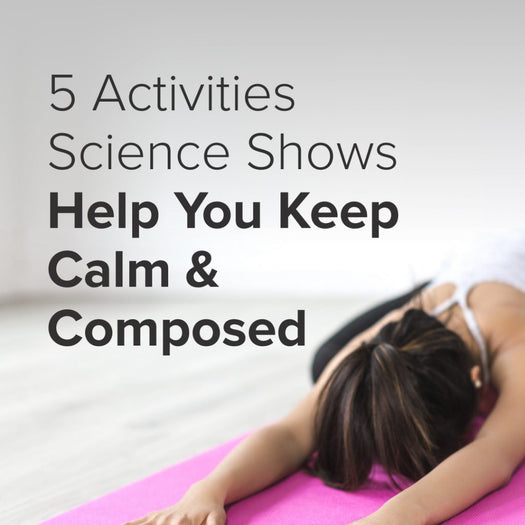5 Activities Science Shows Help You Keep Calm and Composed

With the events happening around the world right now—from illness to job insecurity—it’s no surprise that stress and anxiety are on the rise. In fact, anxiety-related disorders are the most common mental health disorder in the US, affecting some 40 million adults every year (1).
And while we know that mindful practices like yoga, meditation, and other healthy lifestyle habits can help reduce anxious feelings and stressful thoughts, you might be looking for other options to find your zen off your mat. Here are five activities research shows can help you keep calm and unwind.
1. Coloring
While you might be quick to write this off as a kids’ activity, coloring is actually on the rise among adults. You may have seen how mandala coloring books and the like have had a resurgence over the past few years. And for good reason. Studies show that coloring can lead to a more meditative state which can be helpful for minimizing anxious feelings (2). To reap the maximum benefit, you should reach for something with lines—like a mandala, floral design, or animal.

Clinical psychologist Scott M. Bea says activities like coloring (or mowing the lawn or taking a long drive) require “modest attention focused outside of self-awareness (3).” In other words, they help attention flow away from ourselves (and our stress), relax our brain, and help us keep calm and feel more ease. Bea says low-stakes and pleasurable activities, like coloring, are the perfect combination since they’re hard to mess up and there are no consequences if you do.
2. Walking
Aside from being a way to get from point A to point B, walking can offer a host of mental and physical benefits. Like other physical activities, it produces endorphins, which boost your mood and help you relax. According to research, taking a stroll out in nature can help you feel more energized and positive as well as reduce tension and depressive feelings (4).

Mentally, the practice can improve your cognitive function by increasing blood flow to your brain (5) as well as help make you more creative (6). For this reason, it can be beneficial to take a walk before an important meeting or a creative session.
3. Knitting
As we move into a new season—and for many of us, colder months—you might consider knitting up a warm hat or scarf. An online survey of over 3,500 virtual knitters showed they felt more relaxed, creative, and less stressed when needling their yarn (7). And the more often they did, they calmer and happier they felt.

Therapeutic knitting is a thing. It seems that the rhythmic and repetitive nature of the activity triggers the parasympathetic nervous system (rest & digest) which can help feelings of calm. Other studies also show positive effects of knitting for those suffering from eating disorders (8), depression, and chronic pain (9).
4. Journaling
Whether you call it a notebook, gratitude journal, or diary, many studies show the positive effect that putting pen to paper has on mental health (10). By helping you get stressful thoughts out on paper as well as allowing your mind to wander creatively, writing in a journal can act as an outlet for you to express your feelings with less of a filter or judgment.

It can also help clarify your thoughts, feelings, and ideas which can be a useful practice for understanding yourself and self-development. Other studies suggest that journaling also improves brain function (11) and immune response (12) as well as counter the negative effects of stress (13).
Discover the benefits of journaling >
5. Reading
From fiction to nonfiction, crime novels to comedy, studies suggest that any type of reading can offer enormous health benefits. By putting your nose in a book or engaging in other cerebral activities, you can help strengthen your brain, build your vocabulary, and ward off cognitive decline. Studies also suggest that reading fiction novels that explore characters more in-depth can increase our ability to empathize (14).

Is there a cognitive difference between reading on a screen versus on paper? Studies suggest there is. One study showed college-aged students retained more information reading from a book than on a screen. The same study looked at the effect of interruptions on reading and found that intrusions seemed to equally affect screen and paper readers alike (15). The takeaway? Reading more just may help your brain sharpen, especially if it’s a physical book or an eReader.
Read these 10 best meditation books >
To help you boost feelings of calm and relieve anxious thoughts, everyday activities like coloring and walking or journaling and reading can help. So next time you’re looking to unwind, taking that stroll in the park down the street or writing about your day might make the difference and bring benefits to your body and brain as well.
Resources:
- https://adaa.org/about-adaa/press-room/facts-statistics#:~:text=Facts%20%26%20Statistics.%20Advertisement.%20Anxiety%20disorders%20are%20the,yet%20only%2036.9%25%20of%20those%20suffering%20receive%20treatment.
- Curry, Nancy A. & Kasser, Tim. (2005). Can Coloring Mandalas Reduce Anxiety? Journal of the American Art Therapy Association. https://files.eric.ed.gov/fulltext/EJ688443.pdf
- 2020, May 27. 3 Reasons Adult Coloring Can Actually Relax Your Brain (Blog post). https://health.clevelandclinic.org/3-reasons-adult-coloring-can-actually-relax-brain/
- Coon, J. Thompson; Boddy, K.; Stein, K.; Whear, R. & Depledge, M.H. (2011, Feb 3). Does Participating in Physical Activity in Outdoor Natural Environments Have a Greater Effect on Physical and Mental Wellbeing than Physical Activity Indoors? A Systematic Review. ACS Publications. https://pubs.acs.org/doi/abs/10.1021/es102947t
- Nazish, Noma. (2017, November 24). Five Science-Backed Relaxation Techniques To Try if You Hate Meditation (Blog post). https://www.forbes.com/sites/nomanazish/2017/11/24/five-science-backed-relaxation-techniques-to-try-if-you-hate-meditation/#2a0bfac676a4
- Oppezzo, Marily & Schwartz, Daniel L. (2014). Give Your Ideas Some Legs: The Positive Effect of Walking on Creative Thinking. Journal of Experimental Psychology. https://www.apa.org/pubs/journals/releases/xlm-a0036577.pdf
- Riley, Jill; Corkhill, Betsan & Morris, Clare. (2013, February 15). The Benefits of Knitting or Personal and Social Wellbeing in Adulthood: Finding from an International Survey. British Journal of Occupational Therapy. https://journals.sagepub.com/doi/abs/10.4276/030802213X13603244419077
- Brule-Clave, M; Mazloum, A; Park, R J; Harbottle, E J & Birmingham, C L. (2009, March 14). Managing anxiety in eating disorders with knitting. National Library of Medicine. https://pubmed.ncbi.nlm.nih.gov/19367130/
- Stewart, Becky. (2015, November 15). Therapeutic Knitting to Manage Stress, Depression and Chronic Pain (Blog post). http://knitom.com/therapeutic-knitting/
- Watson, L Renee, MSN RN; Fraser, Marianne MSN RN & Ballas, Paul MD. Journaling for Mental Health. University of Rochester Medical Center. https://www.urmc.rochester.edu/encyclopedia/content.aspx?ContentID=4552&ContentTypeID=1
- Baikie, Karen A & Wilhelm, Kay. (2005, September). Emotional and physical health benefits of expressive writing. Advances in Psychiatric Treatment. https://www.cambridge.org/core/journals/advances-in-psychiatric-treatment/article/emotional-and-physical-health-benefits-of-expressive-writing/ED2976A61F5DE56B46F07A1CE9EA9F9F
- Booth, Roger J; Petrie, Keith J & Pennebaker, James W. (1999, April 28). Change in Circulating Lymphocyte Numbers Following Emotional Disclosure: Evidence of Buffering? Stress Medicine. https://onlinelibrary.wiley.com/doi/10.1002/(SICI)1099-1700(199701)13:1%3C23::AID-SMI714%3E3.0.CO;2-E
- Smyth, Joshua M PhD; Johnson, Jillian A PhD; Auer, Brandon J PhD; Lehman, Erik MS; Talamo, Giampaolo MD & Sciamanna, Christopher N MD MPH. (2018, June 13). Online Positive Affect Journaling in the Improvement of Mental Distress and Well-Being in General Medical Patients With Elevated Anxiety Symptoms: A Preliminary Randomized Controlled Trial. JMIR Mental Health. https://mental.jmir.org/2018/4/e11290/
- 2019, October 15. Benefits of Reading Books: How It Can Positively Affect Your Life. Healthline. https://www.healthline.com/health/benefits-of-reading-books
- Myrberg, Caroline & Wiberg, Ninna. Screen vs. paper: what is the difference for reading and learning? UKSG Insights. https://insights.uksg.org/articles/10.1629/uksg.236/
